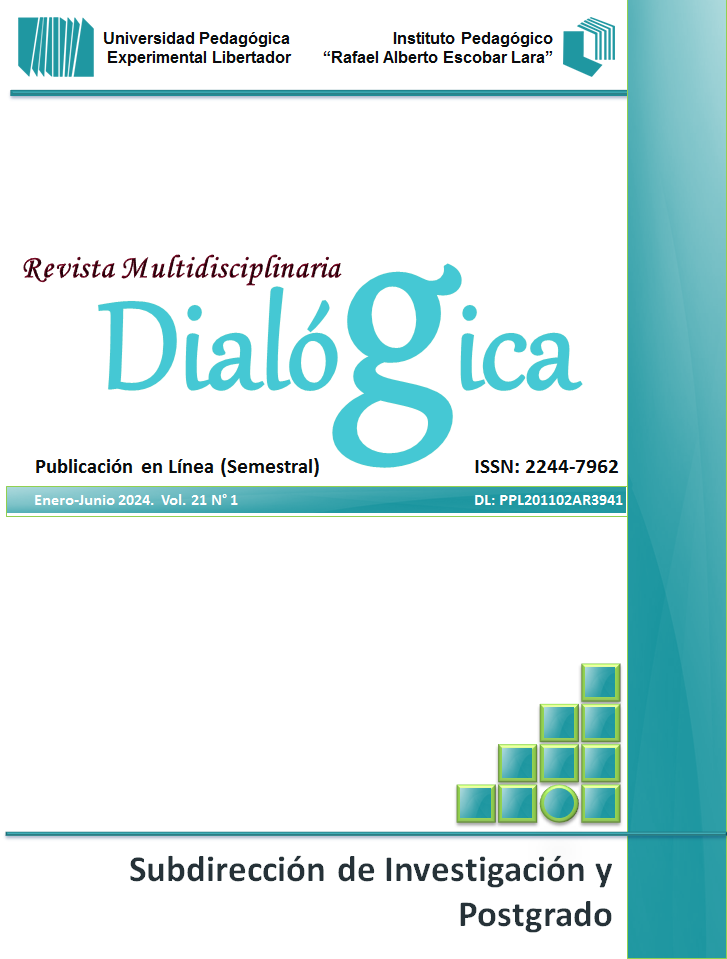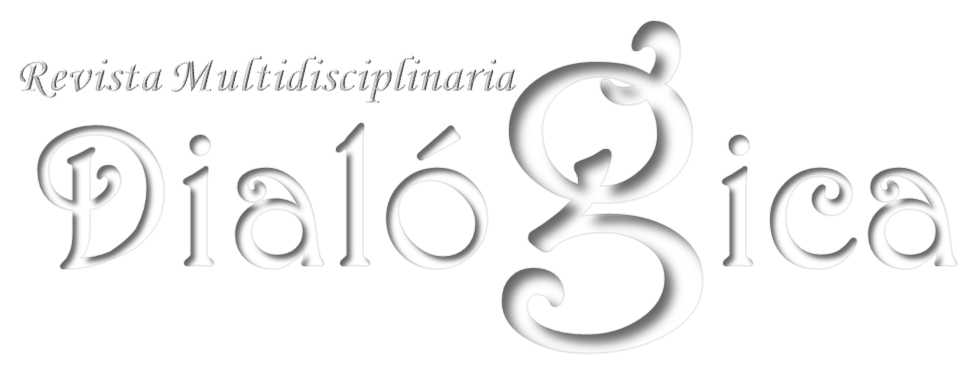INFLUENCE OF THE INTAKE OF FOODS RICH IN CARBOHYDRATES ON CHILDREN'S LEARNING
DOI:
https://doi.org/10.56219/dialgica.v21i1.2953Keywords:
Food, carbohydrates, learning, childhoodAbstract
Understanding the influence of carbohydrate-rich food intake on children's learning is the main purpose of this article. The methodological route was implemented by means of an interpretive qualitative study and the documentation of various articles related to the topic. It can be described that within the knowledge society there are numerous investigations related to food and nutrition, especially in the most vulnerable stages such as childhood and adolescence. It is worth highlighting that the pressure that children experience is leading them to a style of eating where carbohydrates are essential, turning this into a global health problem. In conclusion, this study makes inquiries to put into practice the proper management of carbohydrate intake, seeking to provide a better lifestyle and be successful in the school environment.
References
Agrawal R y Gómez-Pinilla F. (2012). Consumo de carbohidratos. https://pubmed.ncbi.nlm.nih.gov/22473784/
Alimente (2020). Nutrición en niños. https://www.alimente.elconfidencial.com/nutricion/2020-12-12/arroz-integral-blanco-diabetes-azucar-nutrientes_2865996/
Asvold, B. O., Sand, T., Hestad, K., y Bjorgaas, M. R. (2010). Cognitive Function in Type 1 Diabetic Adults with Early Exposure to Severe Hypoglycemia A 16-year follow-up study. Diabetes Care, 33(9), 1945-1947. doi: 10.2337/dc10-0621 DOI: https://doi.org/10.2337/dc10-0621
Benton, D., Owens, D. S., y Parker, P. Y. (1994). Blood glucose influences memory and attention in young adults. Neuropsychologic, 32(5), 595-607. doi: 10.1016/0028-3932(94)90147-3 DOI: https://doi.org/10.1016/0028-3932(94)90147-3
Brutsaert, E. (2023). Hipoglucemia. https://www.msdmanuals.com/es/hogar/trastornos-hormonales-y-metab%C3%B3licos/diabetes-mellitus-y-otros-trastornos-del-metabolismo-de-la-glucosa-sangu%C3%ADnea/hipoglucemia
Codella, R., Benedini, S., Paini, S., Caumo, A., Adamo, M., Terruzzi, I., Ferrulli, A., Macri, C., Andreoni, L., Sterlicchio, M. y Luzi, L. (2017). Effect of Sugar versus Mixed Breakfast on Metabolic and Neurofunctional Responses in Healthy Individuals. Journal of diabetes research, 2017. doi: 10.1155/2017/9634585 DOI: https://doi.org/10.1155/2017/9634585
Corona J. (2018). Investigación cualitativa: fundamentos epistemológicos, teóricos y metodológicos. https://www.redalyc.org/journal/5257/525762351005/html/ DOI: https://doi.org/10.15178/va.2018.144.69-76
Devi, S. S., Devi, R., y Bankimchandra, S. (2017). An exploratory study to assess the effect of breakfast skipping on college performance among Bsc nursing students in MM College of nursing, Mullana, Ambala. IJAR, 3(3), 904-906.
Dunlop B. y Nemeroff C. (2007). El papel de la dopamina en la fisiopatología de la depresión. [Pubmed]. EEUU: Departamento de Psiquiatría y Ciencias de la Conducta; https://www.ncbi.nIm.nih.gov/pubmed/17339521
Ferguson, S. C., Blane, A., Perros, P., Mccrimmon, R. J., Best, J. J., Wardlaw, J., Deary, I.J. y Frier, B. M. (2003). Cognitive ability and brain structure in type 1 diabetes relation to microangiopathy and preceding severe hypoglycemia. Diabetes, 52(1), 149-156. doi: 10.2337/diabetes.52.1.149 DOI: https://doi.org/10.2337/diabetes.52.1.149
Fernández, A. (2018). Tipos de azúcar. https://www.diferenciador.com/fructosa-glucosa-y-sacarosa/#:~:text=La%20fructosa%20es%20un%20az%C3%BAcar,dos%20monosac%C3%A1ridos%20glucosa%20y%20fructosa.
Fernández C. (2020). La Fructuosa. https://www.eufic.org/es/que-contienen-los-alimentos/articulo/que-es-la-fructosa-y-es-mala-para-ti
Garwood P. (2016). Impacto de la Azúcar. https://www.who.int/es/news/item/11-10-2016-who-urges-global-action-to-curtail-consumption-and-health-impacts-of-sugary-drinks
Heraldo (2015). OMS y la Glucosa. https://www.heraldo.es/noticias/salud/2015/03/04/la-asociacion-bebidas-rechaza-recomendacion-la-oms-para-bajar-nivel-azucar-343624-2261131.html
Jasarevic T. (2014). Breakfast staple types affect brain gray matter volume and cognitive function in healthy children. PLoS One, 5(12), e15213. doi: 10.1371/journal.pone.0015213
Kirschbaum R. (2018). OMS, El Consumo de Azúcar. https://www.clarin.com/sociedad/organizacion-mundial-salud-consumo-azucar_0_rJT-w7qwmx.html
National Eating Disorders Association. (2024). Statistics & research on eating disorders. https://www.nationaleatingdisorders.org/statistics-research-eating-disorders
Noble, E. E. Noble, Olson C. A., Davis, E., Tsan L., Chen Y., Schade R., Liu, C. Suarez, A., Jones, R. B., De La Serre, C., Yang, X., Hsiao, E.Y. y Kanoski, S. E. (2021) Gut microbial taxa elevated by dietary sugar disrupt memory function. Translational Psychiatry, 2021; 11 (1) DOI: 10.1038/s41398-021-01309-7 DOI: https://doi.org/10.1038/s41398-021-01309-7
Organización Mundial de la Salud (2018). Ingesta de azucares en adultos y niños. https://iris.who.int/bitstream/handle/10665/154587/WHO_NMH_NHD_15.2_spa.pdf
Pérez, B. (2021). Niveles de azúcar en sangre. https://www.milenio.com/salud/el-azucar-que-es-cuales-son-los-niveles-normales-y-cuanto-consumir
Peters, A. (2011). The selfish brain: competition for energy resources. American Journal of Human Biology, 23(1), 29-34. DOI: https://doi.org/10.1002/ajhb.21106
Pruthi, S. (2024). Hiperglucemia en la diabetes. https://www.mayoclinic.org/es/diseases-conditions/hyperglycemia/symptoms-causes/syc-20373631#descripci%C3%B3n-general
Redacciondiabetes (2024). La azúcar en los niños. https://canaldiabetes.com/cuanto-azucar-nino/
Reinmuth, O. M., Scheinberg, P., y Bourne, B. (1965). Total cerebral blood flow and metabolism: A new method for the repeated serial measurement of total cerebral blood flow using iodoantipyrine (1131) with a report of determination in normal human beings of blood flow, oxygen consumption, glucose utilization and respiratory quotient of the whole brain. Archives of Neurology, 12(1), 49-66. doi: 10.1001/archneur.1965.00460250053007. DOI: https://doi.org/10.1001/archneur.1965.00460250053007
Fundación Slim (2009). Manual de mantenimiento de la salud para personas que viven con DIABETES. https://fundacioncarlosslim.org/diabetes-manual-te-dice-lo-debes-saber/
Stanford Medicine Children’s Health (2024). Hipoglucemia en los niños. https://www.stanfordchildrens.org/es/topic/default?id=hypoglycemiainchildren-90-P05064
Taki, Y., Hashizume, H., Sassa, Y., Takeuchi, H., Asano, M., Asano, K., y Kawashima, R. (2010). Breakfast staple types affect brain gray matter volume and cognitive function in healthy children. PLoS One, 5(12), e15213. doi: 10.1371/journal.pone.0015213 DOI: https://doi.org/10.1371/journal.pone.0015213
Downloads
Published
How to Cite
Issue
Section
License
Copyright (c) 2024 Marcos Antonio Salas Núñez , Amado Marcano Larez

This work is licensed under a Creative Commons Attribution-NonCommercial-ShareAlike 4.0 International License.


 @revistadialogica
@revistadialogica DialogicaUPEL
DialogicaUPEL RevistaDialogicaUPELMaracay
RevistaDialogicaUPELMaracay dialógicaupel@gmail.com
dialógicaupel@gmail.com dialogicaupel.blogspot.com
dialogicaupel.blogspot.com https://issuu.com/dialogicaupel
https://issuu.com/dialogicaupel https://revistas.upel.edu.ve/index.php/dialogica/
https://revistas.upel.edu.ve/index.php/dialogica/









